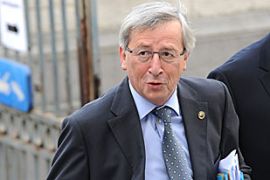EU clears reform-treaty hurdle
Leaders reach deal that could see Lisbon treaty ratified and a president installed.

Klaus sought an opt-out from the treaty three weeks ago, after Prague’s parliament ratified it, in an attempt to ensure the treaty would not allow ethnic Germans expelled from former Czechoslovakia after the second world war to reclaim their property.
The only obstacle to the Klaus’s signature now is a legal challenge by Czech senators, which the country’s constitutional court is expected to dismiss on Tuesday.
Presidential race
EU leaders also moved closer to an agreement on a new president, with former British prime minister Tony Blair’s chances of securing the role receding.
Blair’s hopes faded when his candidacy failed to secure the blessings of European socialists, who are his ruling Labour Party’s allies.
| In depth |
|
|
The post is now more likely to go to a centre-right candidate, with possible contenders including Jan Peter Balkenende, the Dutch prime minister, and Paavo Lipponen, the former Finnish prime minister.
The president, who needs to be elected unanimously, will serve a two-and-a-half-year term, strengthening the current system of a six-month presidency that states hold in turn.
Ratification of the treaty after years of negotiations would encourage the EU in its hopes of increasing its influence on the world stage.
It would also streamline decision-making in the bloc, which is unwieldy now that it has grown to 27 member states representing 495 million people.
